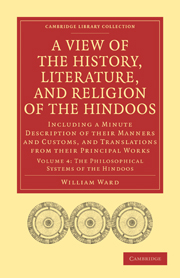 A View of the History, Literature, and Religion of the Hindoos
A View of the History, Literature, and Religion of the Hindoos Sect. I.
OF THE HINDOO PHILOSOPHERS, AND THEIR OPINIONS.
Swayŭmbhoovŭ, or Mŭnoo.
This sage is known in the pooranŭs as the son of Brŭmha, and one of the progenitors of mankind. He is also complimented as the preserver of the védus at the time of the Hindoo deluge, and as having given an abstract of the contents of these books in the work known by his name, and translated by Sir William Jones. It does not appear improbable, that during the life of Mŭnoo, certain works were written, perhaps from tradition, which, after many additions, were called the védŭ or shroolee, “that which has been heard.” Perhaps Mŭnoo himself, and Ulŭrkŭ and Markŭndéyŭ, are to be considered as the compilers, from tradition, of what then existed of these books; for, we are not to suppose that the védŭs were all compiled at one period.
SECT. II.—Kŭpilŭ.
This sage, the grandson of Mŭnoo, was the founder of the Sankhyŭ sect, the author of the original aphorisms to which the sect appeals, and is mentioned in several works as the most eminent of all the ascetics, knowing things past, present, and to come, and, in fact, as able to accomplish whatever he wished. The Shrēē-bhagŭvŭtŭ speaks of him as an incarnation of Vishnoo, and declares, that his appearance on earth was to lead mankind to future happiness, by teaching the doctrines of that school of philosophy of which he was the founder.
To save this book to your Kindle, first ensure [email protected] is added to your Approved Personal Document E-mail List under your Personal Document Settings on the Manage Your Content and Devices page of your Amazon account. Then enter the ‘name’ part of your Kindle email address below. Find out more about saving to your Kindle.
Note you can select to save to either the @free.kindle.com or @kindle.com variations. ‘@free.kindle.com’ emails are free but can only be saved to your device when it is connected to wi-fi. ‘@kindle.com’ emails can be delivered even when you are not connected to wi-fi, but note that service fees apply.
Find out more about the Kindle Personal Document Service.
To save content items to your account, please confirm that you agree to abide by our usage policies. If this is the first time you use this feature, you will be asked to authorise Cambridge Core to connect with your account. Find out more about saving content to Dropbox.
To save content items to your account, please confirm that you agree to abide by our usage policies. If this is the first time you use this feature, you will be asked to authorise Cambridge Core to connect with your account. Find out more about saving content to Google Drive.